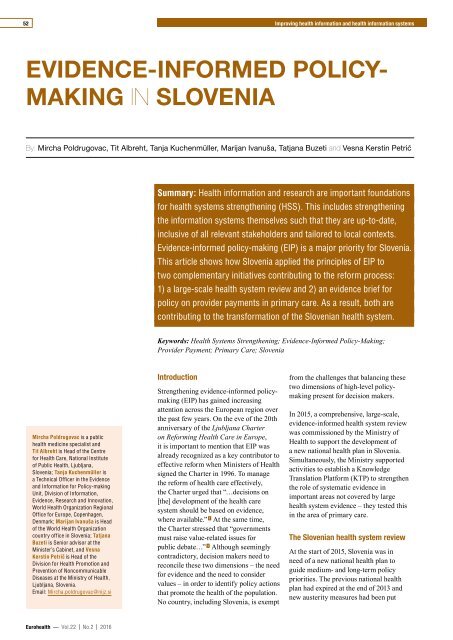EUROHEALTH
Eurohealth-volume22-number2-2016
Eurohealth-volume22-number2-2016
You also want an ePaper? Increase the reach of your titles
YUMPU automatically turns print PDFs into web optimized ePapers that Google loves.
52<br />
Improving health information and health information systems<br />
EVIDENCE-INFORMED POLICY-<br />
MAKING IN SLOVENIA<br />
By: Mircha Poldrugovac, Tit Albreht, Tanja Kuchenmüller, Marijan Ivanuša, Tatjana Buzeti and Vesna Kerstin Petrič<br />
Summary: Health information and research are important foundations<br />
for health systems strengthening (HSS). This includes strengthening<br />
the information systems themselves such that they are up-to-date,<br />
inclusive of all relevant stakeholders and tailored to local contexts.<br />
Evidence-informed policy-making (EIP) is a major priority for Slovenia.<br />
This article shows how Slovenia applied the principles of EIP to<br />
two complementary initiatives contributing to the reform process:<br />
1) a large-scale health system review and 2) an evidence brief for<br />
policy on provider payments in primary care. As a result, both are<br />
contributing to the transformation of the Slovenian health system.<br />
Keywords: Health Systems Strengthening; Evidence-Informed Policy-Making;<br />
Provider Payment; Primary Care; Slovenia<br />
Mircha Poldrugovac is a public<br />
health medicine specialist and<br />
Tit Albreht is Head of the Centre<br />
for Health Care, National Institute<br />
of Public Health, Ljubljana,<br />
Slovenia; Tanja Kuchenmüller is<br />
a Technical Officer in the Evidence<br />
and Information for Policy-making<br />
Unit, Division of Information,<br />
Evidence, Research and Innovation,<br />
World Health Organization Regional<br />
Office for Europe, Copenhagen,<br />
Denmark; Marijan Ivanuša is Head<br />
of the World Health Organization<br />
country office in Slovenia; Tatjana<br />
Buzeti is Senior advisor at the<br />
Minister’s Cabinet, and Vesna<br />
Kerstin Petrič is Head of the<br />
Division for Health Promotion and<br />
Prevention of Noncommunicable<br />
Diseases at the Ministry of Health,<br />
Ljubljana, Slovenia.<br />
Email: Mircha.poldrugovac@nijz.si<br />
Introduction<br />
Strengthening evidence-informed policymaking<br />
(EIP) has gained increasing<br />
attention across the European region over<br />
the past few years. On the eve of the 20th<br />
anniversary of the Ljubljana Charter<br />
on Reforming Health Care in Europe,<br />
it is important to mention that EIP was<br />
already recognized as a key contributor to<br />
effective reform when Ministers of Health<br />
signed the Charter in 1996. To manage<br />
the reform of health care effectively,<br />
the Charter urged that “…decisions on<br />
[the] development of the health care<br />
system should be based on evidence,<br />
where available.” 1 At the same time,<br />
the Charter stressed that “governments<br />
must raise value-related issues for<br />
public debate…” 1 Although seemingly<br />
contradictory, decision makers need to<br />
reconcile these two dimensions – the need<br />
for evidence and the need to consider<br />
values – in order to identify policy actions<br />
that promote the health of the population.<br />
No country, including Slovenia, is exempt<br />
from the challenges that balancing these<br />
two dimensions of high-level policymaking<br />
present for decision makers.<br />
In 2015, a comprehensive, large-scale,<br />
evidence-informed health system review<br />
was commissioned by the Ministry of<br />
Health to support the development of<br />
a new national health plan in Slovenia.<br />
Simultaneously, the Ministry supported<br />
activities to establish a Knowledge<br />
Translation Platform (KTP) to strengthen<br />
the role of systematic evidence in<br />
important areas not covered by large<br />
health system evidence – they tested this<br />
in the area of primary care.<br />
The Slovenian health system review<br />
At the start of 2015, Slovenia was in<br />
need of a new national health plan to<br />
guide medium- and long-term policy<br />
priorities. The previous national health<br />
plan had expired at the end of 2013 and<br />
new austerity measures had been put<br />
Eurohealth — Vol.22 | No.2 | 2016
















